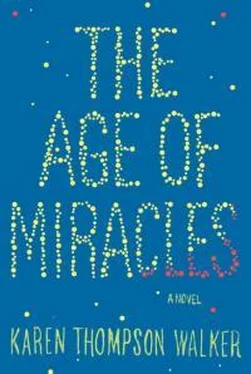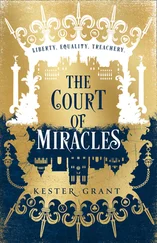But now my mother lifted her dinner plate from her lap and set it on the coffee table. She pulled her hair away from her face, as if to better hear the news. I was sure her roots were turning grayer every day. She’d skipped her monthly salon appointment—and the slowing of the planet had interfered not at all with the speed at which human hair grew.
My father sat on the couch beside her, his mouth tight. I could see him chewing the inside of his cheek. He took one slow sip of beer.
Outside, the sky was bright—the days had swelled beyond thirty hours, and the slowing was showing no signs of letting up.
“Maybe they figured out how to fix things,” I said from the floor, where I’d stretched out on my stomach with the cats.
No one said anything.
Rumors must have surged through certain circles before the official announcement was made. There must have been some early, unconfirmed reports. Doesn’t big news always leak before it’s meant to? Aren’t secrets usually spilled? Anonymous sources love to talk. But if there was any chatter about this development, we hadn’t heard it.
The network took us live to the White House, where the president was waiting behind an enormous polished desk, his hands folded stiffly on its surface. A large American flag hung in folds beside him.
A series of meetings between congressional leaders, White House officials, and the secretaries of Commerce, Agriculture, Transportation, and the Interior had produced a radically simple plan: in the face of massive global change, we, the American people, would be asked to carry on exactly as we always had.
In other words, we would remain on the twenty-four-hour clock.
My first response was disbelief. The cable box glowed a green 11 A.M., but it was the end of the day. We had learned, by then, to disregard the clocks.
“I don’t get it,” I said. “How can we?”
The Chinese government had taken the same sweeping step. The European Union was expected to follow suit. The alternative, we were told, would be disastrous.
“Markets need stability,” said the president. “We can’t continue this way.”
It requires a certain kind of bravery, I suppose, to choose the status quo. There’s a certain boldness to inaction.
But it seemed to me that we were being asked to perform the impossible, as unlikely a strategy as if they’d proposed strapping ropes to the sun and dragging it across the sky.
I waited for my mother to react, but she only sighed a loud sigh. I turned to look at her and saw her as she was: a woman on a couch, looking weary. There’s a limit to shock, I suppose, even for her.
“This is never going to work,” she said.
My father said nothing. That was one of his specialties, I was learning, the ability to remain silent at all the crucial junctures, to meet each crisis with a simple, stalwart quiet. I can see now that I inherited a bit of that habit from him.
My father went back to his dinner. He ate his pizza with a knife and a fork, a paper napkin spread neatly across his knees.
The green of the infield snapped back onto the television screen.
As obvious as the implications would be later, the effects of the plan were not immediately clear to me. What would become apparent soon enough was this: We would fall out of sync with the sun almost immediately. Light would be unhooked from day , darkness unchained from night . And not everyone would go along with the plan.
It was voluntary, of course. We were not required to squeeze our days into twenty-four little hours. No new law was passed or put into place. This was America. The government could not dictate the way we lived our lives. But in the week following the president’s announcement, as the natural days swelled to a record thirty-two hours, officials of various levels and types of expertise went to work convincing us of the virtues of the plan—and the urgency with which we needed to launch it. Clock time, they called it, the only practical solution. It was a matter of economic stability, said the politicians, of competitive advantage, and even, some insisted, national security.
I know now that clock time ignited a complex national debate—with just as many dissenters shouting from the far left as from the far right—but in my memory, it happened all at once, a clean tidal shift, abrupt and complete.
The public schools jumped on board right away. Government offices, too. The television networks all decided to comply. The corporations were definitely doing it—they’d been losing millions every week in inefficiency and overtime pay.
But any American could choose to forgo clock time, to remain instead on daylight time, or what some were already referring to as real time. We were still free to arrange our lives around the sun’s comings and goings if we wished, but soon those who did risked losing their jobs or having to quit. Their children could no longer practically attend public school. They’d be perpetually out of time with society. To hesitate would have been like choosing to linger in some evacuated city where the buildings and the streets remain, but the city, let’s face it, has disappeared.
And so it was: We reclaimed the clocks. Wristwatches returned to wrists. Batteries were replaced. I cleared my nightstand of books so that I could once again see my alarm clock from my bed. I pulled my grandfather’s pocket watch out of a drawer and set it on my desk.
Clock time began at two A.M. on a Saturday night, like daylight saving time. They’d chosen a day when the sun rose more or less in tune with the clocks. In that era, synchronized days like these rolled around every few weeks like full moons. The gap would widen as the day passed, but the idea was to transition us slowly.
The sun rose that morning at clock time 7:02 A.M. The Sunday paper landed in the driveway with a thud. My father ground the coffee early, toasted toast. The sun shone as usual on the eastern side of the house. We would feel the real differences only the next day, when we, like the clocks, would fall completely out of sync with the sun.
“This can’t be healthy,” said my mother, squinting in her green terry-cloth bathrobe. Her hair was wild from sleep.
I was sitting beside her in flannel pajamas, weaving a friendship bracelet for Hanna. Her birthday was a few weeks away.
“This is the best of bad options,” said my father from the table.
The cats paced at my feet, hungry for milk. Tony’s bony tail flicked my shins as he passed. The sun was shining in the kitchen, catching on the copper pots that dangled, sparkling, above the steel sink.
“What are the other bad options?” I asked.
My mother was filling a copper can with water for the two milky white orchids that lived in the kitchen window. Her attention to her plants had increased since the start of the slowing, as if our survival somehow hinged on theirs. Or maybe it was something else entirely. Beauty can be a very reassuring thing.
“You know what I think?” said my mother. “I think this whole clock thing is a crock of shit.”
Tony jumped on the counter, paws first. I swooped him up and set him down on the tile.
“We’ll survive,” said my father.
As a doctor, he was already a night worker, a day sleeper, a deliverer of babies in the middle of the night. He was a creature whose body had grown accustomed years ago to ignoring its circadian rhythms.
“What about the real problem?” said my mother. We’d gained more than thirty minutes the night before. “What is anyone doing about that?”
My father continued reading the paper, slowly shuffling the pages. Missing from that day’s paper were the details of an even more audacious plan, still top-secret at the time but being furiously plotted by scientists and engineers in the government labs of this country. We would soon learn the details—and the hubris—of the infamous, ill-fated Virginia Project. Absurd as it was, you have to admire the spirit of the endeavor, the wild sense of possibility, the cowboy optimism required to imagine that a bit of human ingenuity might actually control the turning of the earth.
Читать дальше












